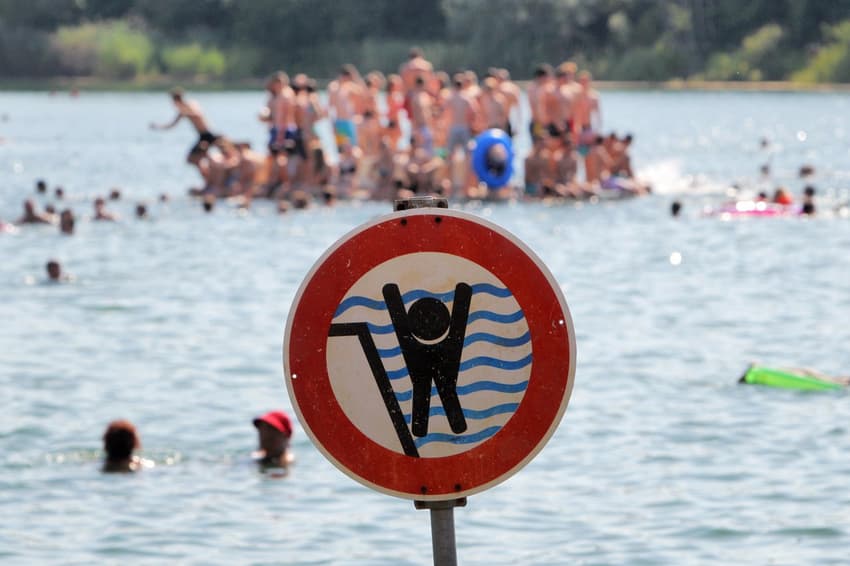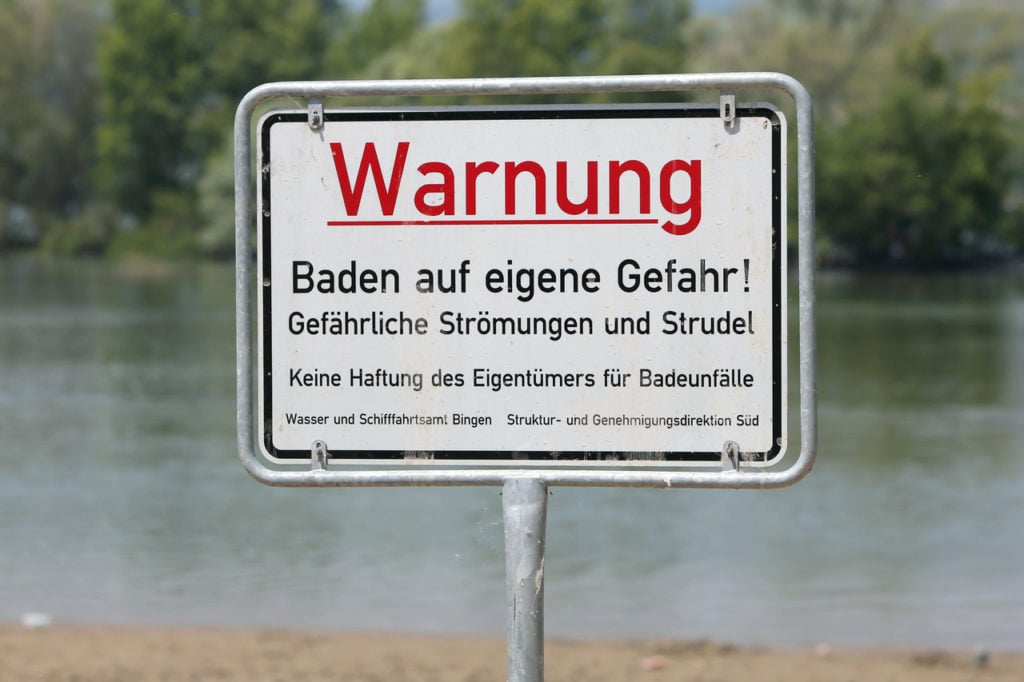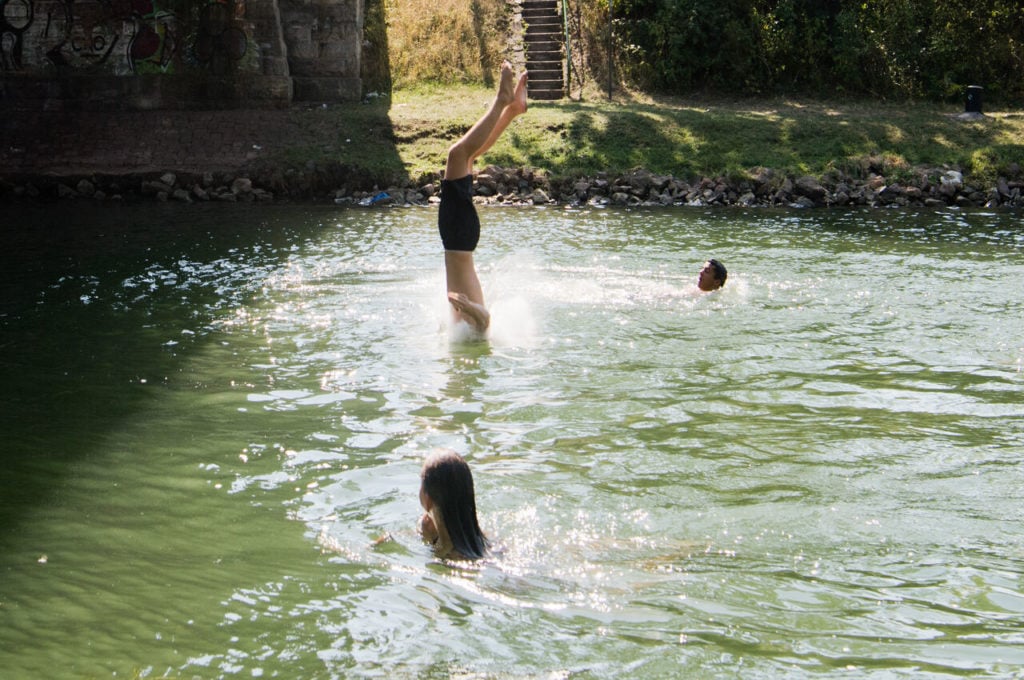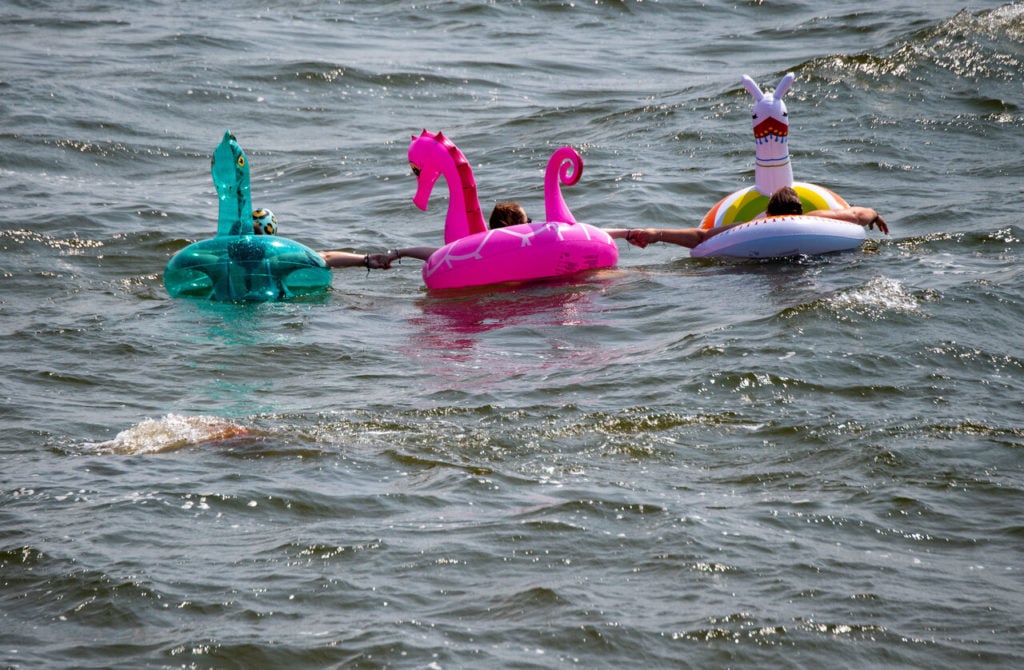How to stay safe while swimming outdoors in Germany this summer

Summer is a great time to enjoy the outdoors and cool off in Germany's lakes, rivers, seas and outdoor pools. But it's important to be aware of the potential dangers associated with swimming outside.
According to the German Life Saving Association (DLRG), the number of drowning incidents is on the rise in Germany, with at least 355 deaths recorded last year alone.
Of these, 308 deaths occurred in inland waters: 47 people drowned in lakes, 105 in rivers, 15 in streams, 22 in ponds, and 19 in canals, according to the DLRG. Swimming pools accounted for 13 fatalities, while 18 people lost their lives in the sea. Bavaria had the highest number of drowning deaths, with 69 reported cases.
These statistics highlight the importance of understanding water safety and taking necessary precautions to prevent accidents and tragedies. We’ve put together some tips to help you stay safe this summer.
Know your limits
If you haven’t been swimming for years and suddenly decide that you fancy trying to swim to the other side of the lake – think again.
According to the DLRG, one of the most common causes of drowning in Germany is overconfidence in the water, combined with poor swimming skills.
READ ALSO: Germany's top 10 most beautiful summer swimming spots
So it’s really important to stay within your ability when embarking on an outdoor swim: if you can’t swim well, don’t venture out any further than where you are able to stand up.
Knowing your limits also means not drinking alcohol before going into the water, as this can impair your judgment, coordination, and reaction time and significantly increases the risk of accidents.
Follow the signs
The DLRG strongly advises swimming only at designated and supervised bathing spots and to heed any warning signs. Designated swimming areas undergo regular inspections and have additional safety measures in place to ensure a secure swimming experience.
As a rule of thumb, it's important to note that if a swimming location does not charge an entrance fee, it is highly likely that there won't be a lifeguard present.

A sign on a beach in Ingelheim, Rhineland-Palatinate says: "Bathing at your own risk”. Photo: picture alliance / Fredrik Von Erichsen/dpa | Fredrik von Erichsen
Germany follows the Europe-wide beach flag system on its coasts and lakes. Under this system, a red flag indicates a bathing ban - due to dangers such as strong currents, high waves, or water pollution, while a red and yellow flag indicates a designated and supervised bathing area. There are often buoys in place in these areas as well.
An additional yellow flag warns bathers to take increased caution and marks a swimming ban for inexperienced swimmers, older people, and children.
READ ALSO: Travel in Germany: A guide to Berlin’s best lakes
A zone with black and white flags is reserved for water sports and is generally not suitable for swimmers.
As well as looking out for flags, it's also important to pay attention to signs that warn of area-specific dangers, such as a sudden slope or shallow water.
Swim with others
The DLRG recommends that, whenever possible, you should swim with a buddy or in groups, as having someone else nearby can provide assistance in case of an emergency.
Be aware of dangers
Jumping or diving into unfamiliar waters is a bad idea, as it's often difficult to tell how deep a body of water is, which can lead to serious injuries.
As well as assessing water depth, you should also be mindful of other water activities happening around you, such as boating or jet skiing. Try to avoid crowded areas and maintain a safe distance from boats and other swimmers.
Supervise children
Tragically, in 2022, 20 children between the ages of 0 and 10 died in water in Germany.
Small children and non-swimmers need to be constantly supervised in the water, even if they have flotation aids such as armbands or swim belts and if there are lifeguards around.
The DLRG advice is that children should always be supervised and be within arm's reach of an adult.
Cool down before jumping in
Jumping into cold water when overheated can put a significant strain on the body - particularly the heart. The sudden temperature difference can potentially cause severe circulatory problems and can lead to drowning.
It's therefore a good idea to follow cool down a bit first before taking the plunge.
Don’t go swimming with a full stomach
There is a good reason behind the old adage that you shouldn’t go swimming with a full stomach. In the best-case scenario, swimming with a full belly can cause discomfort and side stitches, but in the worst case, it can lead to vomiting and a circulatory collapse. In the water, losing consciousness without a nearby helper can result in drowning.
On the other hand, going swimming hungry also isn’t a good idea. You should make sure that you are suitably fuelled up with food and water so that you have the energy you need to keep afloat.
Avoid rivers unless you’re a strong swimmer
Rivers are dangerous places to swim and were the sites of the most drownings in Germany last year.

A young man jumps head-first into the Stichkanal in Hannover-Linden, Lower Saxony. Photo: picture alliance/dpa | Julian Stratenschulte
Rivers can be full of unexpected dangers, such as tidal currents, debris like branches and underwater obstacles like discarded bicycles. Due to the constant exchange of water, rivers also never warm up as much as lakes, and it can be difficult for the body to adapt to the cold.
Really, only those who are fit, healthy and experienced swimmers should even think about swimming in a river in Germany.
Seek shelter during thunderstorms
Always keep a close eye on the weather conditions while swimming outdoors. If a thunderstorm approaches, it's vital to leave the water immediately.
Swimming during a thunderstorm is extremely dangerous as water can conduct lightning currents, and strong gusts of wind can pose additional risks by propelling branches or other objects through the air. In the sea, storms can generate high waves and strong surf. So if you learn that a storm is approaching, you should leave the water immediately and seek shelter.
Be careful with inflatables
Buoyancy aids such as inflatable water animals, tyres, water balls and the like are at best toys and not safe aids for bathing and open water swimming.

Three people float on inflatable toys in the sea in Heringsdorf, Mecklenburg-Western Pomerania. Photo: picture alliance/dpa/dpa-Zentralbild | Stefan Sauer
In fact, they can actually be very dangerous as they can easily get swept off into deep water.
Children's swimming seats are not a good idea for the sea, as they can be life-threatening if, for example, children topple over with them in a wave and are unable to stand up again on their own.
Check the water quality
Besides drowning, there are other dangers lurking in many of Germany's watery areas.
Dangers in lakes include the rapid growth of blue-green algae, which produce toxins that can cause various health issues such as nausea, vomiting, and respiratory diseases. In salt and fresh water, a bacteria called vibrios can cause severe wound infections when entering the body through skin injuries, resulting in symptoms like skin blistering, fever, and shock.
READ ALSO: Living in Germany: Making the most of culture and lake life
If you have a swimming spot in mind, you should look up its water quality online beforehand, by searching the name of the lake along with Wasserqualität (water quality). The water quality of open bodies of water is checked regularly from May to September in Germany and most German states will keep an up-to-date map of their local swimming spots and their water quality online.
Comments
See Also
According to the German Life Saving Association (DLRG), the number of drowning incidents is on the rise in Germany, with at least 355 deaths recorded last year alone.
Of these, 308 deaths occurred in inland waters: 47 people drowned in lakes, 105 in rivers, 15 in streams, 22 in ponds, and 19 in canals, according to the DLRG. Swimming pools accounted for 13 fatalities, while 18 people lost their lives in the sea. Bavaria had the highest number of drowning deaths, with 69 reported cases.
These statistics highlight the importance of understanding water safety and taking necessary precautions to prevent accidents and tragedies. We’ve put together some tips to help you stay safe this summer.
Know your limits
If you haven’t been swimming for years and suddenly decide that you fancy trying to swim to the other side of the lake – think again.
According to the DLRG, one of the most common causes of drowning in Germany is overconfidence in the water, combined with poor swimming skills.
READ ALSO: Germany's top 10 most beautiful summer swimming spots
So it’s really important to stay within your ability when embarking on an outdoor swim: if you can’t swim well, don’t venture out any further than where you are able to stand up.
Knowing your limits also means not drinking alcohol before going into the water, as this can impair your judgment, coordination, and reaction time and significantly increases the risk of accidents.
Follow the signs
The DLRG strongly advises swimming only at designated and supervised bathing spots and to heed any warning signs. Designated swimming areas undergo regular inspections and have additional safety measures in place to ensure a secure swimming experience.
As a rule of thumb, it's important to note that if a swimming location does not charge an entrance fee, it is highly likely that there won't be a lifeguard present.

Germany follows the Europe-wide beach flag system on its coasts and lakes. Under this system, a red flag indicates a bathing ban - due to dangers such as strong currents, high waves, or water pollution, while a red and yellow flag indicates a designated and supervised bathing area. There are often buoys in place in these areas as well.
An additional yellow flag warns bathers to take increased caution and marks a swimming ban for inexperienced swimmers, older people, and children.
READ ALSO: Travel in Germany: A guide to Berlin’s best lakes
A zone with black and white flags is reserved for water sports and is generally not suitable for swimmers.
As well as looking out for flags, it's also important to pay attention to signs that warn of area-specific dangers, such as a sudden slope or shallow water.
Swim with others
The DLRG recommends that, whenever possible, you should swim with a buddy or in groups, as having someone else nearby can provide assistance in case of an emergency.
Be aware of dangers
Jumping or diving into unfamiliar waters is a bad idea, as it's often difficult to tell how deep a body of water is, which can lead to serious injuries.
As well as assessing water depth, you should also be mindful of other water activities happening around you, such as boating or jet skiing. Try to avoid crowded areas and maintain a safe distance from boats and other swimmers.
Supervise children
Tragically, in 2022, 20 children between the ages of 0 and 10 died in water in Germany.
Small children and non-swimmers need to be constantly supervised in the water, even if they have flotation aids such as armbands or swim belts and if there are lifeguards around.
The DLRG advice is that children should always be supervised and be within arm's reach of an adult.
Cool down before jumping in
Jumping into cold water when overheated can put a significant strain on the body - particularly the heart. The sudden temperature difference can potentially cause severe circulatory problems and can lead to drowning.
It's therefore a good idea to follow cool down a bit first before taking the plunge.
Don’t go swimming with a full stomach
There is a good reason behind the old adage that you shouldn’t go swimming with a full stomach. In the best-case scenario, swimming with a full belly can cause discomfort and side stitches, but in the worst case, it can lead to vomiting and a circulatory collapse. In the water, losing consciousness without a nearby helper can result in drowning.
On the other hand, going swimming hungry also isn’t a good idea. You should make sure that you are suitably fuelled up with food and water so that you have the energy you need to keep afloat.
Avoid rivers unless you’re a strong swimmer
Rivers are dangerous places to swim and were the sites of the most drownings in Germany last year.

Rivers can be full of unexpected dangers, such as tidal currents, debris like branches and underwater obstacles like discarded bicycles. Due to the constant exchange of water, rivers also never warm up as much as lakes, and it can be difficult for the body to adapt to the cold.
Really, only those who are fit, healthy and experienced swimmers should even think about swimming in a river in Germany.
Seek shelter during thunderstorms
Always keep a close eye on the weather conditions while swimming outdoors. If a thunderstorm approaches, it's vital to leave the water immediately.
Swimming during a thunderstorm is extremely dangerous as water can conduct lightning currents, and strong gusts of wind can pose additional risks by propelling branches or other objects through the air. In the sea, storms can generate high waves and strong surf. So if you learn that a storm is approaching, you should leave the water immediately and seek shelter.
Be careful with inflatables
Buoyancy aids such as inflatable water animals, tyres, water balls and the like are at best toys and not safe aids for bathing and open water swimming.

In fact, they can actually be very dangerous as they can easily get swept off into deep water.
Children's swimming seats are not a good idea for the sea, as they can be life-threatening if, for example, children topple over with them in a wave and are unable to stand up again on their own.
Check the water quality
Besides drowning, there are other dangers lurking in many of Germany's watery areas.
Dangers in lakes include the rapid growth of blue-green algae, which produce toxins that can cause various health issues such as nausea, vomiting, and respiratory diseases. In salt and fresh water, a bacteria called vibrios can cause severe wound infections when entering the body through skin injuries, resulting in symptoms like skin blistering, fever, and shock.
READ ALSO: Living in Germany: Making the most of culture and lake life
If you have a swimming spot in mind, you should look up its water quality online beforehand, by searching the name of the lake along with Wasserqualität (water quality). The water quality of open bodies of water is checked regularly from May to September in Germany and most German states will keep an up-to-date map of their local swimming spots and their water quality online.
Join the conversation in our comments section below. Share your own views and experience and if you have a question or suggestion for our journalists then email us at [email protected].
Please keep comments civil, constructive and on topic – and make sure to read our terms of use before getting involved.
Please log in here to leave a comment.